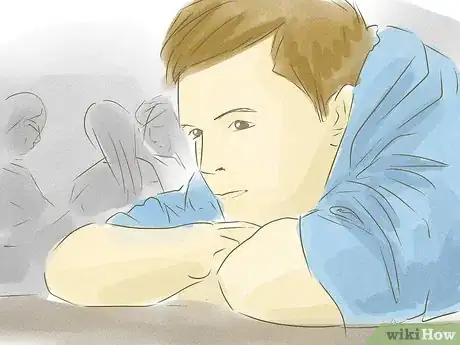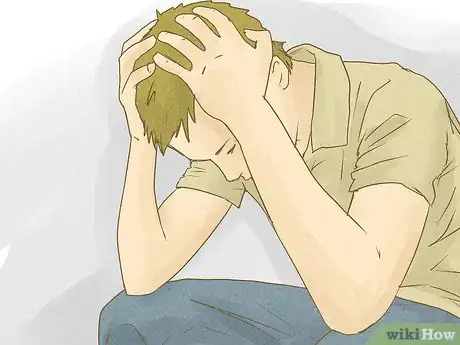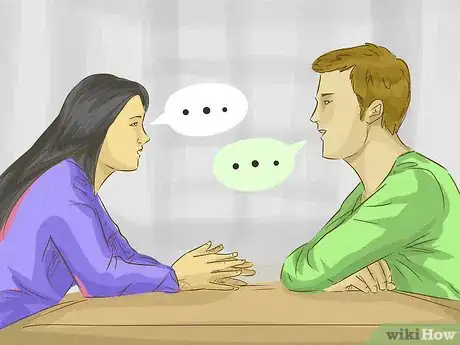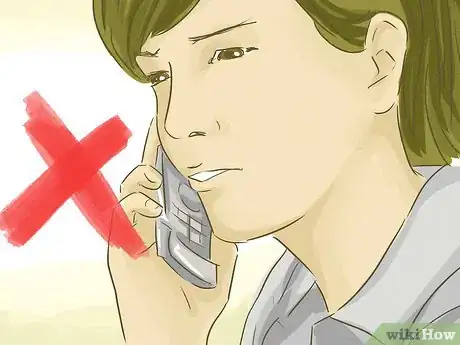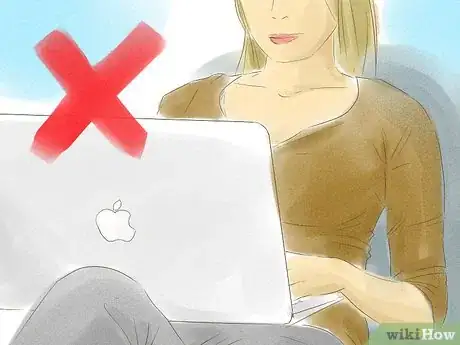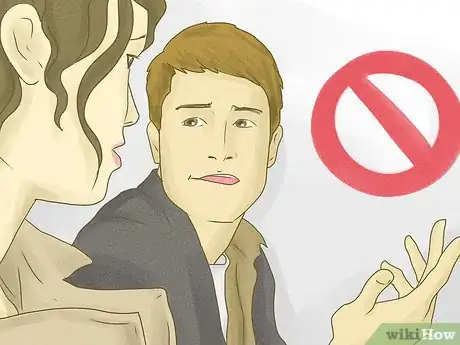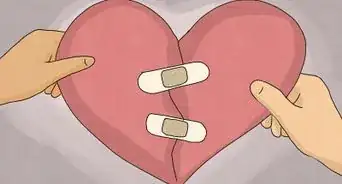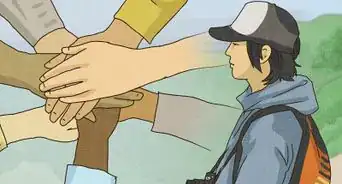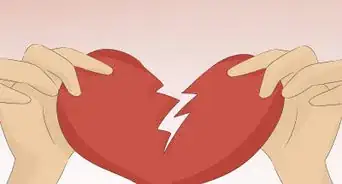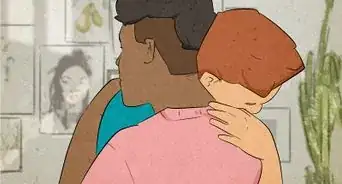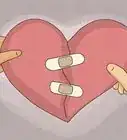This article was co-authored by Klare Heston, LCSW. Klare Heston is a Licensed Independent Clinical Social Worker based in Cleveland, Ohio. With experience in academic counseling and clinical supervision, Klare received her Master of Social Work from the Virginia Commonwealth University in 1983. She also holds a 2-Year Post-Graduate Certificate from the Gestalt Institute of Cleveland, as well as certification in Family Therapy, Supervision, Mediation, and Trauma Recovery and Treatment (EMDR).
This article has been viewed 81,430 times.
Ending a relationship, even a short-term relationship, can be difficult. Sometimes it is very clear from the beginning of the relationship that the relationship is not going anywhere. In this case, it is often best to decide to end the relationship early and talk to your partner about it.
Steps
Deciding to End the Relationship
-
1Reflect on your feelings. Examine all of the reasons why you want to end the relationship. Make a pros and cons list if you really need to outline the reasons the relationship won’t work. This will help you be sure that you are making the right decision by ending the relationship early.
-
2Understand that feeling guilty and unsure is normal. It is ok and even normal to be unsure about breaking off the new relationship. You may feel guilty for hurting your partner’s feelings. You may feel like you should give the relationship more time to see if your feelings change.[1]Advertisement
-
3Ask yourself if it is best to end the relationship sooner rather than later. Many times, dragging out a relationship will only make you and your partner more invested in the relationship. If you feel like this will be the case, it is best to end the relationship sooner. If you think that the relationship might be healed, you can consider giving it more time.[2]
Talking it Through
-
1Attempt to talk in person. If it is not possible to talk face-to-face, call your partner on the phone. Try to avoid texting, emailing, or messaging on social media. Definitely don’t end the relationship by avoiding your partner altogether or "ghosting." Be sure to treat your partner with respect during your conversation, and expect that your partner treat you with respect as well.[3]
- Choose a neutral location with some degree of privacy. Try to avoid either party’s residence. A local park or cafe is best. This will help keep everyone’s reactions low-key and allow for you to exit quickly if needed.[4]
-
2Remain positive. Try to avoid playing the blame game. Discuss the reasons why you need to end the relationship and why it is the best decision for you. If you are honest and respectful with your partner, they are likely to be respectful in return.[5]
- Don’t say things like, “You are too controlling.” Instead, say something like “I need more space in my life right now.”
-
3Be confident. Make sure that your partner understands that this is definitely a breakup. Do not give the impression that you are trying to fix the relationship. This will confuse your partner and make them think that the relationship might work out.[6]
- Say something definitive like, “I think the relationship is over, and I need to move on;" or " "I know this isn't what you want, but it is what I need."
-
4Remain firm in your decision. Your partner may not want to end the relationship. They may cry, scream, or beg you to reconsider. Remain calm and be compassionate but don’t allow this to change your mind.
- Say something like, “I really hate to hurt you like this but this is what is best for me.”
-
5Be prepared to leave. Your partner may not react to the news of your breakup well. It would be normal to see them cry or raise their voice. However, it is possible that they become very angry and abusive, either emotionally or physically. This is another reason why it is important to break up with your partner in a public space rather than in either party’s residence.[7]
- If you think that your partner may become violent, consider breaking up over the phone instead of face-to-face.
- If you think that you are in danger you should call the police. Don't hesitate if you feel your safety is threatened — trust your instincts and call for help.
Creating Space
-
1Stop calling and texting them. Allow the break-up some time before you communicate with your ex again. Both you and your ex need time to heal and move on. Calls and texts immediately after a breakup can be confusing for both sides. Your ex also deserves the chance to move on. Moving on will be difficult for them if you continue to act as though you are not confident in your decision to end the relationship.[8]
- If you ex calls you, politely say, “I need some space. Please do not contact me for now.”
- Do not respond to any further communication. If they continue to contact you, ignore them rather than continue to engage with them and repeat your requests for them to stop.
-
2Don’t be tempted by social media. Stop commenting on their Facebook page or liking their Instagram post. If the temptation is too much to handle, consider unfollowing them for a while. You can always continue to follow them after you have both moved past the relationship.[9]
- Unfollowing your ex from social media will help to curb jealousy that may occur as you each move on to the next relationship.
-
3Resist the urge to meet up with your ex. Breakups, even from short-term relationships, can be difficult. You or your ex might feel guilty or lonely and could become vulnerable and possibly do something that you will regret in a face-to-face meet up. It is important to give yourself and your ex time to heal.
- Spend time with your friends and keep busy, distracting yourself with plenty of activities. Breakups are hard no matter what, even if you are certain you want to end the relationship.
Expert Q&A
-
QuestionWhat does a short-term relationship mean?
 Klare Heston, LCSWKlare Heston is a Licensed Independent Clinical Social Worker based in Cleveland, Ohio. With experience in academic counseling and clinical supervision, Klare received her Master of Social Work from the Virginia Commonwealth University in 1983. She also holds a 2-Year Post-Graduate Certificate from the Gestalt Institute of Cleveland, as well as certification in Family Therapy, Supervision, Mediation, and Trauma Recovery and Treatment (EMDR).
Klare Heston, LCSWKlare Heston is a Licensed Independent Clinical Social Worker based in Cleveland, Ohio. With experience in academic counseling and clinical supervision, Klare received her Master of Social Work from the Virginia Commonwealth University in 1983. She also holds a 2-Year Post-Graduate Certificate from the Gestalt Institute of Cleveland, as well as certification in Family Therapy, Supervision, Mediation, and Trauma Recovery and Treatment (EMDR).
Licensed Social Worker A short-term relationship means that there is no commitment or plan for the long run. Each person is free to come and go.
A short-term relationship means that there is no commitment or plan for the long run. Each person is free to come and go. -
QuestionWhat defines a long-term relationship?
 Klare Heston, LCSWKlare Heston is a Licensed Independent Clinical Social Worker based in Cleveland, Ohio. With experience in academic counseling and clinical supervision, Klare received her Master of Social Work from the Virginia Commonwealth University in 1983. She also holds a 2-Year Post-Graduate Certificate from the Gestalt Institute of Cleveland, as well as certification in Family Therapy, Supervision, Mediation, and Trauma Recovery and Treatment (EMDR).
Klare Heston, LCSWKlare Heston is a Licensed Independent Clinical Social Worker based in Cleveland, Ohio. With experience in academic counseling and clinical supervision, Klare received her Master of Social Work from the Virginia Commonwealth University in 1983. She also holds a 2-Year Post-Graduate Certificate from the Gestalt Institute of Cleveland, as well as certification in Family Therapy, Supervision, Mediation, and Trauma Recovery and Treatment (EMDR).
Licensed Social Worker A long-term relationship has a common goal of remaining together into the future and being open to forever. Usually, in this kind of relationship, there is a good amount of overlap between goals, friendships, and family.
A long-term relationship has a common goal of remaining together into the future and being open to forever. Usually, in this kind of relationship, there is a good amount of overlap between goals, friendships, and family. -
QuestionWhat should I say to break up with a girl?
 Klare Heston, LCSWKlare Heston is a Licensed Independent Clinical Social Worker based in Cleveland, Ohio. With experience in academic counseling and clinical supervision, Klare received her Master of Social Work from the Virginia Commonwealth University in 1983. She also holds a 2-Year Post-Graduate Certificate from the Gestalt Institute of Cleveland, as well as certification in Family Therapy, Supervision, Mediation, and Trauma Recovery and Treatment (EMDR).
Klare Heston, LCSWKlare Heston is a Licensed Independent Clinical Social Worker based in Cleveland, Ohio. With experience in academic counseling and clinical supervision, Klare received her Master of Social Work from the Virginia Commonwealth University in 1983. She also holds a 2-Year Post-Graduate Certificate from the Gestalt Institute of Cleveland, as well as certification in Family Therapy, Supervision, Mediation, and Trauma Recovery and Treatment (EMDR).
Licensed Social Worker Be open, direct, and honest, but tactful and kind. Keep the focus on yourself (i.e., "I am not happy in this relationship so I need to stop seeing you.").
Be open, direct, and honest, but tactful and kind. Keep the focus on yourself (i.e., "I am not happy in this relationship so I need to stop seeing you.").
Warnings
- Be prepared for your partner or their friends and family to be angry.⧼thumbs_response⧽
- If, at any time, you think you are in physical danger, contact the police.⧼thumbs_response⧽
References
- ↑ http://www.mindbodygreen.com/0-13488/the-best-way-to-end-a-casual-relationship.html
- ↑ https://www.eharmony.com/dating-advice/dating/like-date-enough-stop-seeing-people/#.WEBkzSMrIy4
- ↑ https://www.psychologytoday.com/blog/fulfillment-any-age/201506/the-most-compassionate-way-end-relationship
- ↑ http://theartofcharm.com/break-ups-divorce/how-to-break-up-without-being-a-jerk/
- ↑ https://www.psychologytoday.com/blog/rediscovering-love/201405/when-its-time-let-relationship-go
- ↑ https://www.psychologytoday.com/blog/rediscovering-love/201405/when-its-time-let-relationship-go
- ↑ http://theartofcharm.com/break-ups-divorce/how-to-break-up-without-being-a-jerk/
- ↑ http://www.mindbodygreen.com/0-13488/the-best-way-to-end-a-casual-relationship.html
- ↑ http://www.mindbodygreen.com/0-13488/the-best-way-to-end-a-casual-relationship.html
